Politics of Conflict: A Comparative Study of Palestine and Iraq
VerifiedAdded on 2023/06/03
|5
|1297
|465
Essay
AI Summary
This essay provides a comparative analysis of the political situations in Palestine and Iraq, focusing on the factors contributing to their current states. It examines the protracted conflict with Zionism, factionalism, and the role of Islam in shaping Palestinian identity. The essay also explores the history of violence and instability in Iraq, highlighting the impact of foreign intervention and the rise of religious leaders. By analyzing these two cases, the essay elucidates the characteristics of weak states and societies, emphasizing the challenges they face in achieving social change and resisting external exploitation. The role of Islamist movements in both Palestine and Iraq is also discussed, highlighting their resistance efforts and influence on political dynamics. Desklib provides students access to similar solved assignments and study tools.
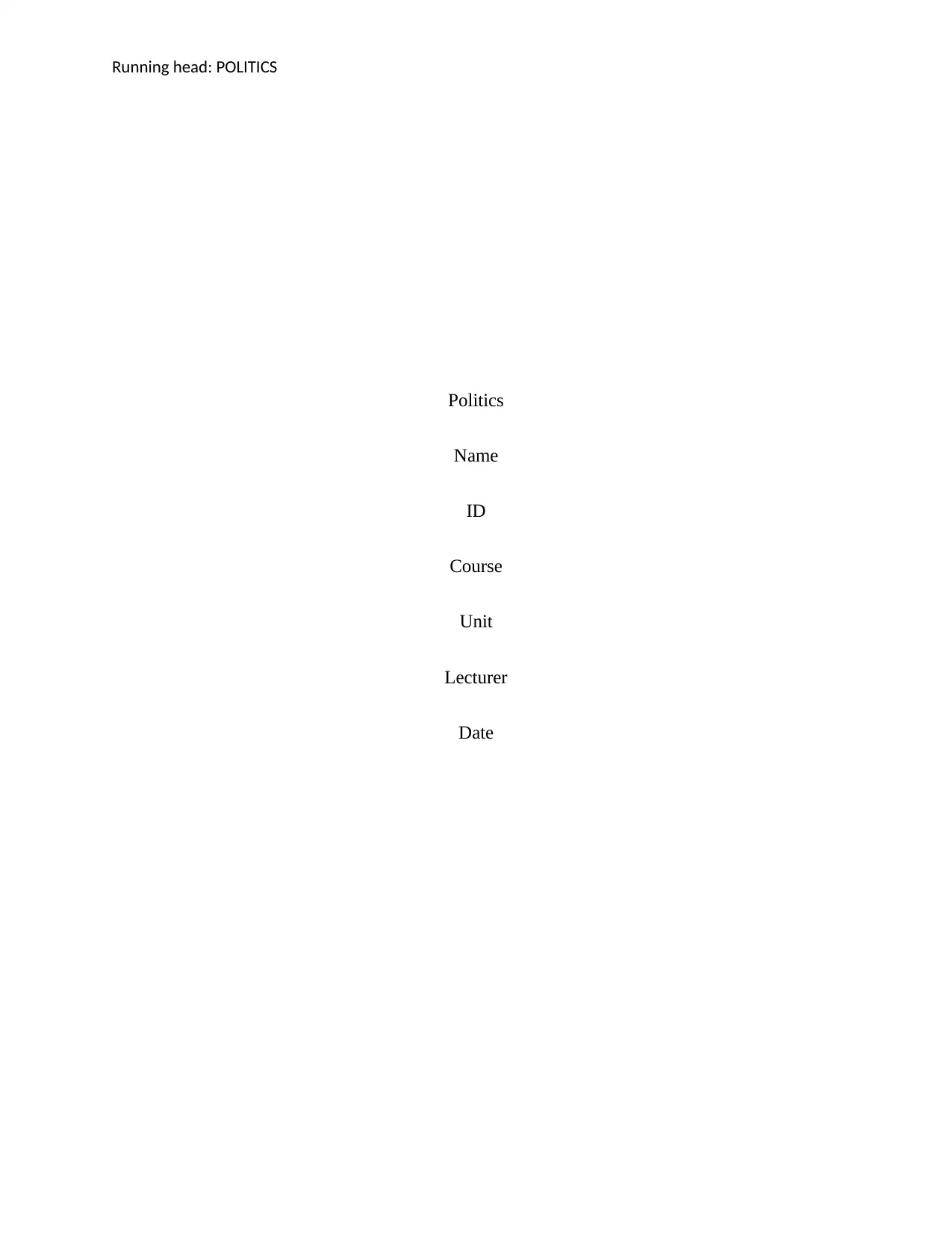
Running head: POLITICS
Politics
Name
ID
Course
Unit
Lecturer
Date
Politics
Name
ID
Course
Unit
Lecturer
Date
Paraphrase This Document
Need a fresh take? Get an instant paraphrase of this document with our AI Paraphraser
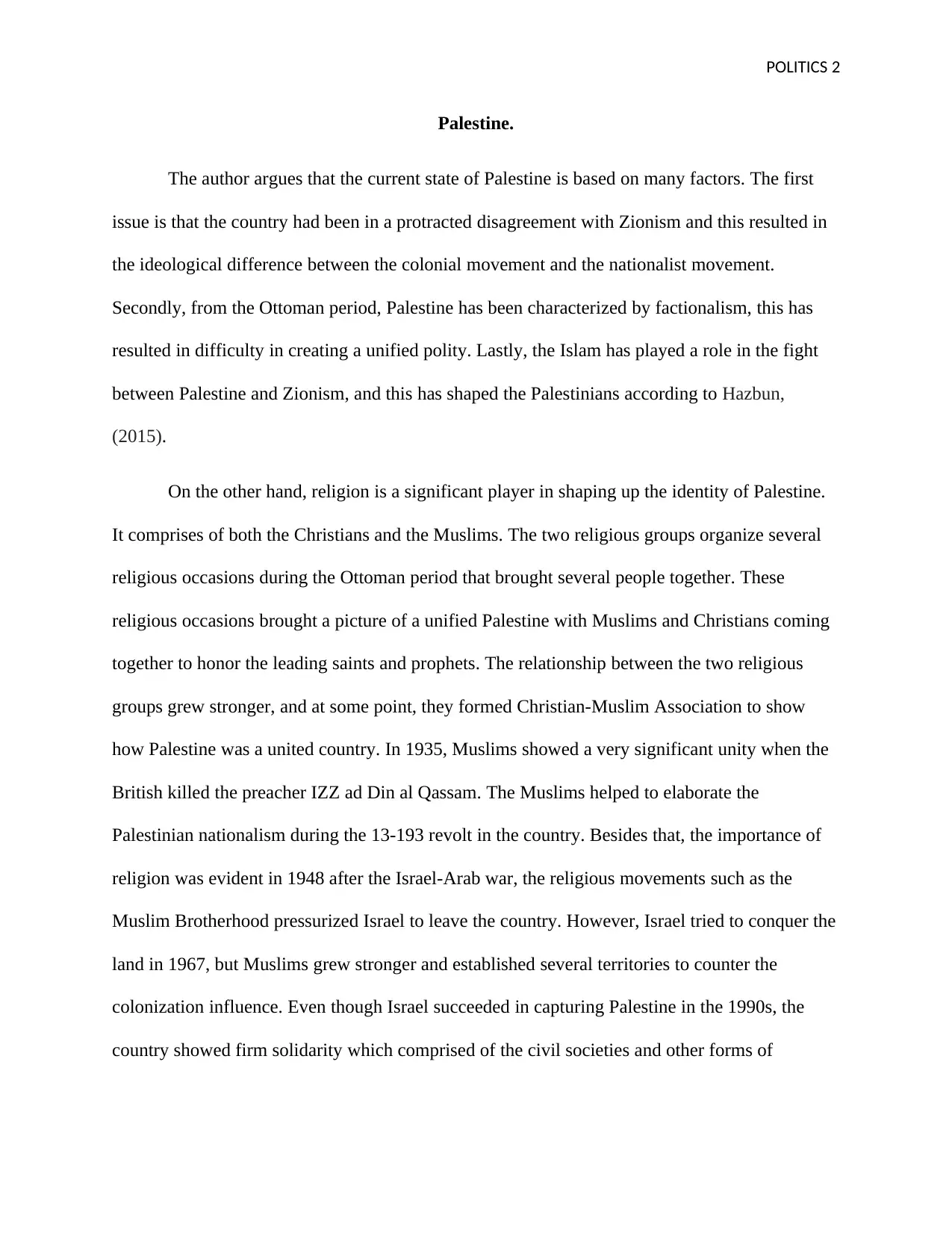
POLITICS 2
Palestine.
The author argues that the current state of Palestine is based on many factors. The first
issue is that the country had been in a protracted disagreement with Zionism and this resulted in
the ideological difference between the colonial movement and the nationalist movement.
Secondly, from the Ottoman period, Palestine has been characterized by factionalism, this has
resulted in difficulty in creating a unified polity. Lastly, the Islam has played a role in the fight
between Palestine and Zionism, and this has shaped the Palestinians according to Hazbun,
(2015).
On the other hand, religion is a significant player in shaping up the identity of Palestine.
It comprises of both the Christians and the Muslims. The two religious groups organize several
religious occasions during the Ottoman period that brought several people together. These
religious occasions brought a picture of a unified Palestine with Muslims and Christians coming
together to honor the leading saints and prophets. The relationship between the two religious
groups grew stronger, and at some point, they formed Christian-Muslim Association to show
how Palestine was a united country. In 1935, Muslims showed a very significant unity when the
British killed the preacher IZZ ad Din al Qassam. The Muslims helped to elaborate the
Palestinian nationalism during the 13-193 revolt in the country. Besides that, the importance of
religion was evident in 1948 after the Israel-Arab war, the religious movements such as the
Muslim Brotherhood pressurized Israel to leave the country. However, Israel tried to conquer the
land in 1967, but Muslims grew stronger and established several territories to counter the
colonization influence. Even though Israel succeeded in capturing Palestine in the 1990s, the
country showed firm solidarity which comprised of the civil societies and other forms of
Palestine.
The author argues that the current state of Palestine is based on many factors. The first
issue is that the country had been in a protracted disagreement with Zionism and this resulted in
the ideological difference between the colonial movement and the nationalist movement.
Secondly, from the Ottoman period, Palestine has been characterized by factionalism, this has
resulted in difficulty in creating a unified polity. Lastly, the Islam has played a role in the fight
between Palestine and Zionism, and this has shaped the Palestinians according to Hazbun,
(2015).
On the other hand, religion is a significant player in shaping up the identity of Palestine.
It comprises of both the Christians and the Muslims. The two religious groups organize several
religious occasions during the Ottoman period that brought several people together. These
religious occasions brought a picture of a unified Palestine with Muslims and Christians coming
together to honor the leading saints and prophets. The relationship between the two religious
groups grew stronger, and at some point, they formed Christian-Muslim Association to show
how Palestine was a united country. In 1935, Muslims showed a very significant unity when the
British killed the preacher IZZ ad Din al Qassam. The Muslims helped to elaborate the
Palestinian nationalism during the 13-193 revolt in the country. Besides that, the importance of
religion was evident in 1948 after the Israel-Arab war, the religious movements such as the
Muslim Brotherhood pressurized Israel to leave the country. However, Israel tried to conquer the
land in 1967, but Muslims grew stronger and established several territories to counter the
colonization influence. Even though Israel succeeded in capturing Palestine in the 1990s, the
country showed firm solidarity which comprised of the civil societies and other forms of
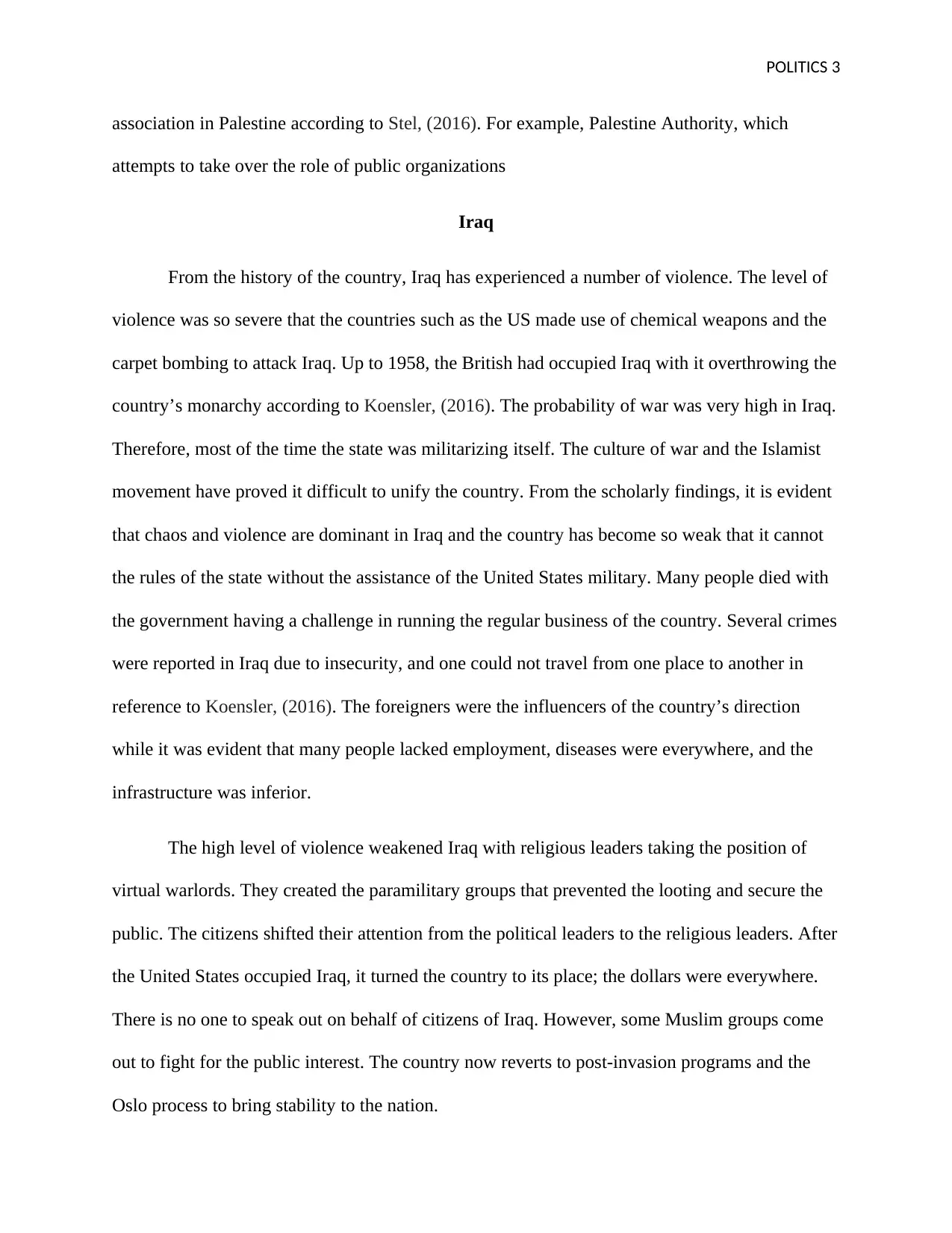
POLITICS 3
association in Palestine according to Stel, (2016). For example, Palestine Authority, which
attempts to take over the role of public organizations
Iraq
From the history of the country, Iraq has experienced a number of violence. The level of
violence was so severe that the countries such as the US made use of chemical weapons and the
carpet bombing to attack Iraq. Up to 1958, the British had occupied Iraq with it overthrowing the
country’s monarchy according to Koensler, (2016). The probability of war was very high in Iraq.
Therefore, most of the time the state was militarizing itself. The culture of war and the Islamist
movement have proved it difficult to unify the country. From the scholarly findings, it is evident
that chaos and violence are dominant in Iraq and the country has become so weak that it cannot
the rules of the state without the assistance of the United States military. Many people died with
the government having a challenge in running the regular business of the country. Several crimes
were reported in Iraq due to insecurity, and one could not travel from one place to another in
reference to Koensler, (2016). The foreigners were the influencers of the country’s direction
while it was evident that many people lacked employment, diseases were everywhere, and the
infrastructure was inferior.
The high level of violence weakened Iraq with religious leaders taking the position of
virtual warlords. They created the paramilitary groups that prevented the looting and secure the
public. The citizens shifted their attention from the political leaders to the religious leaders. After
the United States occupied Iraq, it turned the country to its place; the dollars were everywhere.
There is no one to speak out on behalf of citizens of Iraq. However, some Muslim groups come
out to fight for the public interest. The country now reverts to post-invasion programs and the
Oslo process to bring stability to the nation.
association in Palestine according to Stel, (2016). For example, Palestine Authority, which
attempts to take over the role of public organizations
Iraq
From the history of the country, Iraq has experienced a number of violence. The level of
violence was so severe that the countries such as the US made use of chemical weapons and the
carpet bombing to attack Iraq. Up to 1958, the British had occupied Iraq with it overthrowing the
country’s monarchy according to Koensler, (2016). The probability of war was very high in Iraq.
Therefore, most of the time the state was militarizing itself. The culture of war and the Islamist
movement have proved it difficult to unify the country. From the scholarly findings, it is evident
that chaos and violence are dominant in Iraq and the country has become so weak that it cannot
the rules of the state without the assistance of the United States military. Many people died with
the government having a challenge in running the regular business of the country. Several crimes
were reported in Iraq due to insecurity, and one could not travel from one place to another in
reference to Koensler, (2016). The foreigners were the influencers of the country’s direction
while it was evident that many people lacked employment, diseases were everywhere, and the
infrastructure was inferior.
The high level of violence weakened Iraq with religious leaders taking the position of
virtual warlords. They created the paramilitary groups that prevented the looting and secure the
public. The citizens shifted their attention from the political leaders to the religious leaders. After
the United States occupied Iraq, it turned the country to its place; the dollars were everywhere.
There is no one to speak out on behalf of citizens of Iraq. However, some Muslim groups come
out to fight for the public interest. The country now reverts to post-invasion programs and the
Oslo process to bring stability to the nation.
⊘ This is a preview!⊘
Do you want full access?
Subscribe today to unlock all pages.

Trusted by 1+ million students worldwide
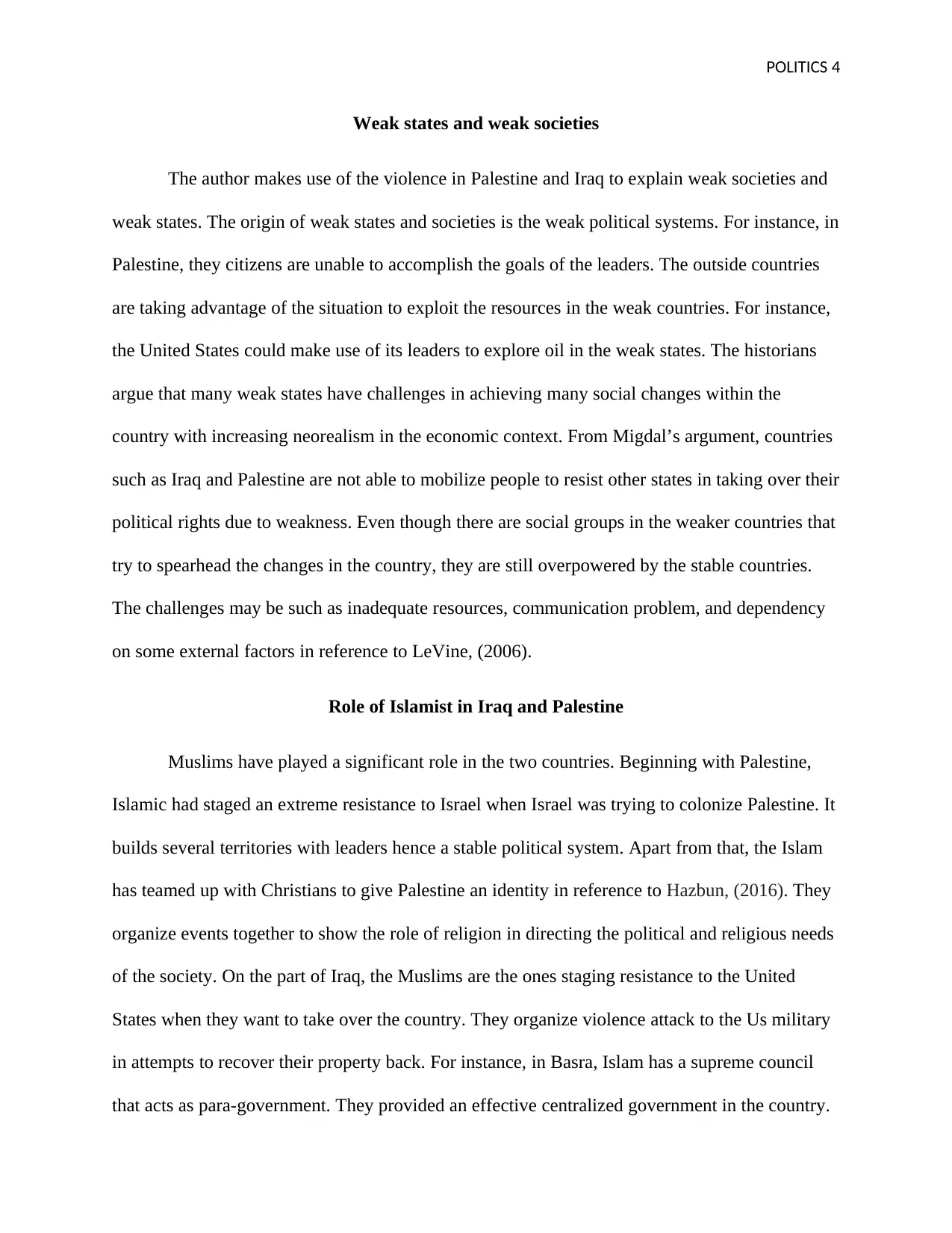
POLITICS 4
Weak states and weak societies
The author makes use of the violence in Palestine and Iraq to explain weak societies and
weak states. The origin of weak states and societies is the weak political systems. For instance, in
Palestine, they citizens are unable to accomplish the goals of the leaders. The outside countries
are taking advantage of the situation to exploit the resources in the weak countries. For instance,
the United States could make use of its leaders to explore oil in the weak states. The historians
argue that many weak states have challenges in achieving many social changes within the
country with increasing neorealism in the economic context. From Migdal’s argument, countries
such as Iraq and Palestine are not able to mobilize people to resist other states in taking over their
political rights due to weakness. Even though there are social groups in the weaker countries that
try to spearhead the changes in the country, they are still overpowered by the stable countries.
The challenges may be such as inadequate resources, communication problem, and dependency
on some external factors in reference to LeVine, (2006).
Role of Islamist in Iraq and Palestine
Muslims have played a significant role in the two countries. Beginning with Palestine,
Islamic had staged an extreme resistance to Israel when Israel was trying to colonize Palestine. It
builds several territories with leaders hence a stable political system. Apart from that, the Islam
has teamed up with Christians to give Palestine an identity in reference to Hazbun, (2016). They
organize events together to show the role of religion in directing the political and religious needs
of the society. On the part of Iraq, the Muslims are the ones staging resistance to the United
States when they want to take over the country. They organize violence attack to the Us military
in attempts to recover their property back. For instance, in Basra, Islam has a supreme council
that acts as para-government. They provided an effective centralized government in the country.
Weak states and weak societies
The author makes use of the violence in Palestine and Iraq to explain weak societies and
weak states. The origin of weak states and societies is the weak political systems. For instance, in
Palestine, they citizens are unable to accomplish the goals of the leaders. The outside countries
are taking advantage of the situation to exploit the resources in the weak countries. For instance,
the United States could make use of its leaders to explore oil in the weak states. The historians
argue that many weak states have challenges in achieving many social changes within the
country with increasing neorealism in the economic context. From Migdal’s argument, countries
such as Iraq and Palestine are not able to mobilize people to resist other states in taking over their
political rights due to weakness. Even though there are social groups in the weaker countries that
try to spearhead the changes in the country, they are still overpowered by the stable countries.
The challenges may be such as inadequate resources, communication problem, and dependency
on some external factors in reference to LeVine, (2006).
Role of Islamist in Iraq and Palestine
Muslims have played a significant role in the two countries. Beginning with Palestine,
Islamic had staged an extreme resistance to Israel when Israel was trying to colonize Palestine. It
builds several territories with leaders hence a stable political system. Apart from that, the Islam
has teamed up with Christians to give Palestine an identity in reference to Hazbun, (2016). They
organize events together to show the role of religion in directing the political and religious needs
of the society. On the part of Iraq, the Muslims are the ones staging resistance to the United
States when they want to take over the country. They organize violence attack to the Us military
in attempts to recover their property back. For instance, in Basra, Islam has a supreme council
that acts as para-government. They provided an effective centralized government in the country.
Paraphrase This Document
Need a fresh take? Get an instant paraphrase of this document with our AI Paraphraser
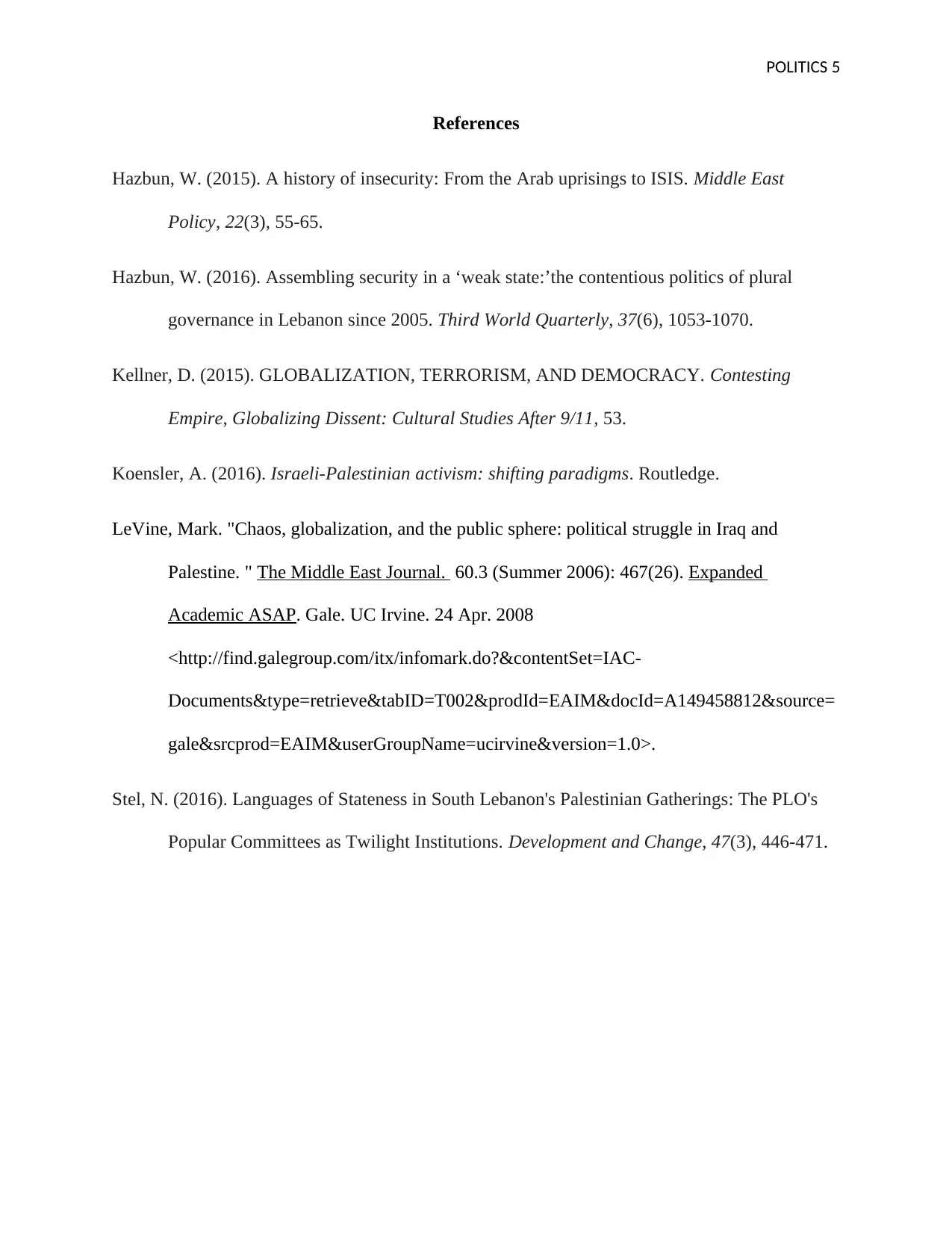
POLITICS 5
References
Hazbun, W. (2015). A history of insecurity: From the Arab uprisings to ISIS. Middle East
Policy, 22(3), 55-65.
Hazbun, W. (2016). Assembling security in a ‘weak state:’the contentious politics of plural
governance in Lebanon since 2005. Third World Quarterly, 37(6), 1053-1070.
Kellner, D. (2015). GLOBALIZATION, TERRORISM, AND DEMOCRACY. Contesting
Empire, Globalizing Dissent: Cultural Studies After 9/11, 53.
Koensler, A. (2016). Israeli-Palestinian activism: shifting paradigms. Routledge.
LeVine, Mark. "Chaos, globalization, and the public sphere: political struggle in Iraq and
Palestine. " The Middle East Journal. 60.3 (Summer 2006): 467(26). Expanded
Academic ASAP. Gale. UC Irvine. 24 Apr. 2008
<http://find.galegroup.com/itx/infomark.do?&contentSet=IAC-
Documents&type=retrieve&tabID=T002&prodId=EAIM&docId=A149458812&source=
gale&srcprod=EAIM&userGroupName=ucirvine&version=1.0>.
Stel, N. (2016). Languages of Stateness in South Lebanon's Palestinian Gatherings: The PLO's
Popular Committees as Twilight Institutions. Development and Change, 47(3), 446-471.
References
Hazbun, W. (2015). A history of insecurity: From the Arab uprisings to ISIS. Middle East
Policy, 22(3), 55-65.
Hazbun, W. (2016). Assembling security in a ‘weak state:’the contentious politics of plural
governance in Lebanon since 2005. Third World Quarterly, 37(6), 1053-1070.
Kellner, D. (2015). GLOBALIZATION, TERRORISM, AND DEMOCRACY. Contesting
Empire, Globalizing Dissent: Cultural Studies After 9/11, 53.
Koensler, A. (2016). Israeli-Palestinian activism: shifting paradigms. Routledge.
LeVine, Mark. "Chaos, globalization, and the public sphere: political struggle in Iraq and
Palestine. " The Middle East Journal. 60.3 (Summer 2006): 467(26). Expanded
Academic ASAP. Gale. UC Irvine. 24 Apr. 2008
<http://find.galegroup.com/itx/infomark.do?&contentSet=IAC-
Documents&type=retrieve&tabID=T002&prodId=EAIM&docId=A149458812&source=
gale&srcprod=EAIM&userGroupName=ucirvine&version=1.0>.
Stel, N. (2016). Languages of Stateness in South Lebanon's Palestinian Gatherings: The PLO's
Popular Committees as Twilight Institutions. Development and Change, 47(3), 446-471.
1 out of 5
Your All-in-One AI-Powered Toolkit for Academic Success.
+13062052269
info@desklib.com
Available 24*7 on WhatsApp / Email
![[object Object]](/_next/static/media/star-bottom.7253800d.svg)
Unlock your academic potential
Copyright © 2020–2025 A2Z Services. All Rights Reserved. Developed and managed by ZUCOL.

